Comparing: Enemy Events
The Art of War 9:5.20-31: Birds gather.
This post continues our project explaining each stanza of Sun Tzu’s work. The English translation and Chinese transliterations are from my award-winning book, The Art of War and The Ancient Chinese Revealed.
The ideas explained in this article are from the tenth through fifteenth stanzas of Section Five of Chapter 9 of The Art of War. This chapter is entitled Armed March. Its general topic is making competitive moves that advance our positions. It is one of the longest and most detailed chapters in the book, and this is one of its longest sections. These stanza’s focus on interpreting what we see into knowledge of an opponent’s situation.
All six stanzas here are two lines. The first line describes the uncommon events that we observe. These observations are about what is happening to our opposition. Every change creates an opportunity. In many ways, this series of stanzas chart the increasing problems of an opposing rival.
In the lines below, we summarize each Chinese character with a single English word shown in < > brackets in their original order. This transliteration of the Chinese is followed by an English sentence translation.
We can learn about others from how their environment reacts to their actions.
<Birds> <gather>
Birds gather.<Your> <enemy> <has> <abandoned> <his> <camp>
Your enemy has abandoned his camp.
This is the first stanza in this chapter that mentions the <enemy>, that is, our fellow competitors. Many things can be left behind at an abandoned military position. The U.S. abandonment of Afghanistan is a extreme, recent example. Such leftovers attract those who feed on scraps. These includes many types of small competitors that feed on abandoned scraps of food, but, in the natural environment, birds are the easiest for outsiders to see.
Every competitive arena has its own type of scavengers. A scavenger is not interested in staking out a new position in the territory, simply living off the remains of an abandoned one. However, since this camp belonged to a one-time competitor of ours, we might be able to use it as an addition or an expansion of our positions. A territory others have abandoned may or may not be an opportunity for us, depending on how our skills differ from that of the abandoning rival.
Abandoning a camp is a “top management” decision. It is an external change in position. In the next stanzas, Sun Tzu’s focus shifts to the regular soldiers and officers. Their behavior portrays increasing degrees of internal problems.
The Behavior of Individuals
<Your> <enemy’s> <soldiers> <call> <in> <the> <night>
Your enemy’s soldiers call in the night.<They> <are> <afraid>
They are afraid.
In the time of Sun Tzu, armies were easy to join but hard to escape from. Today, individuals can leave from most strategic positions easily. Perhaps in some cases, such as marriage, it easier than it should be.
However, long before people leave their positions, they start complaining. They do this “at night,” that is, “secretly, so their organizations don’t punish them. People can complain about or leave existing positions for many reasons, but the fact that they are afraid means that they fear losing.
This fear creates a couple of opportunities for their opponents. First, division means that their organizations are not unified, so the organization is weak. Unity is strength. Division is weakness. Second, it means that others can acquire key individuals from them more easily.
<Your> <enemy’s> <army> <is> <raucous>
Your enemy’s army is raucous.<The> <men> <do> <not> <take> <their> <commander> <seriously>
The men do not take their commander seriously.
In this stanza, instead of being fearful, the men in the army are rowdy and disorderly. The job of maintaining order in an army or an organization is the job of its officers or middle management.
Here, the fear is reversed. Instead of the men being fearful, middle management is afraid of disciplining them. Instead of being united in their fear of external competition, middle management is afraid of internal rebellion.
Divisions in Organizations
The larger the organization, the more divisions there are within it. These large divisions can become independent, with their own separate goals and identities.
<Your> <enemy’s> <banners> <and> <flags> <shift>
Your enemy’s banners and flags shift.
<Order> <is> <breaking> <down>
Order is breaking down.
The only thing that can cause a realignment of the different divisions within an organization is a change of its internal politics. Leaders of individual divisions are seen as more politically powerful, having more control than higher management. The danger here is that these divisional leaders will go to war against each other for limited internal resources.
The fact that “banners and flags” shift means that the various groups within the organization are willing to publicly display their alignment. Organization politics are usually kept quiet. Showing their differences not only means that top management isn’t respected, but that the divisions already see themselves as strong enough to act independently. One of Sun Tzu’s basic strategies is to tackle such divided foes one separate division at a time.
Further Deterioration
<Your> <enemy’s> <officers> <are> <irritable>
Your enemy’s officers are irritable.<They> <are> <exhausted>
They are exhausted.
When decision-makers are exhausted, they make poor decisions. The top management may choose a good strategy, but with tired, middle management, they will not be able to execute it. Their irritability can make it easy to provoke these midlevel divisions into dangerous field positions.
<Your> <enemy’s> <men> <kill> <their> <horses> <for> <meat>
Your enemy’s men kill their horses for meat.<They> <are> <out> <of> <provisions>
They are out of provisions.
While we today do not kill our horses for meat, we can sacrifice long-term assets to meet immediate needs. When we run out of liquid assets, the ones needed for short-term survival, we are forced into consuming long term assets. It is often the final step before a complete collapse.



